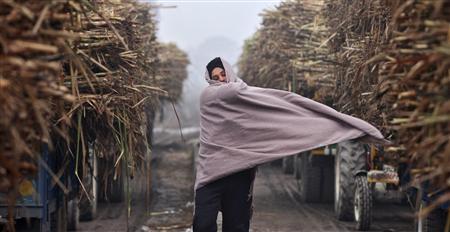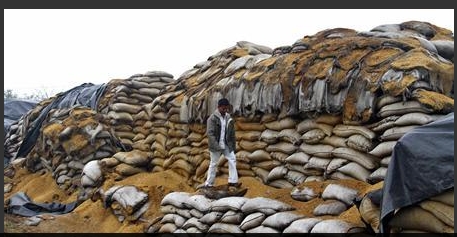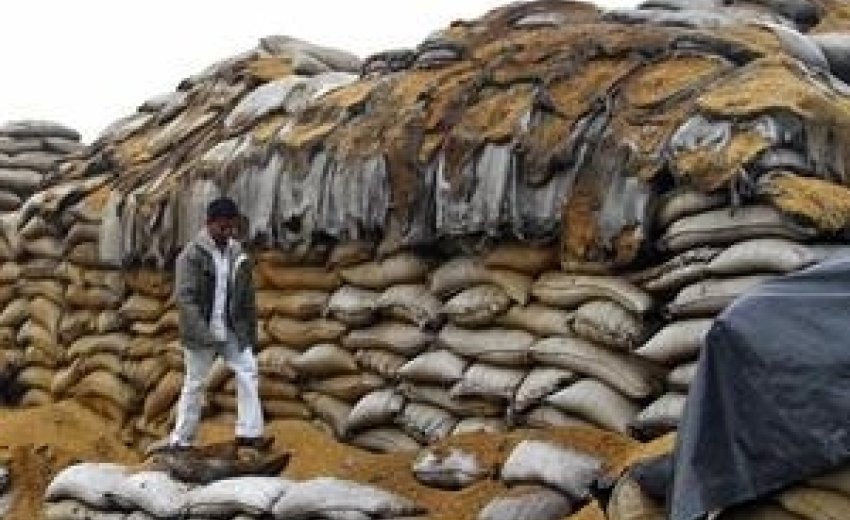LUDHIANA, Jan 29, 2012: (Reuters) - Punjab made Sunil Jain's family rich, but now he wishes he could afford to leave.
Almost every day, the lights go out and machines shut down at the two factories of his $3-million-a-year packaging business in the northern India state. When the power goes out, the plants have to use generators, at up to three times the cost.
Profits at Oswal Polypack shrink every year, says Jain, a 49-year-old with a penchant for fat gold jewelry and chewing tobacco. The state government seems not to care and has even raised taxes on the raw materials he needs.
"How can we survive?" Jain said from his factory office in an industrial park in the city of Ludhiana whose roads are dotted with potholes.
"How can industry remain here, when there is no power, when you face labor shortages?" he said. "The government has been promising power for the past five years, but what we have got instead is power cuts of up to 12 hours a day."
While much of India has galloped ahead in recent years on the back of a reform drive that began two decades ago, Punjab has somehow been left straggling behind.
The Congress party, which leads the federal government, has leapt on that lag to woo Punjab's voters for a return to power in the state of 27 million people in elections there on January 30.
Firms like Sunil Jain's are moving to neighboring states where land is cheaper and labor is more readily available, he says. Another gripe is that states such as Himachal Pradesh next door have been granted long tax holidays as part of a federal assistance program, putting Punjabi firms at a disadvantage.
GREEN REVOLUTION
In the 1960s and 1970s, Punjab was a rare Indian success story. A star of former prime minister Indira Gandhi's Green Revolution - a massive farm program credited with ending famine in the country - Punjab drove growth at a time when India was throttled by the "Licence Raj," an all-pervading system of permits and quotas.
But after reforms in 1991 unleashed a boom in Asia's third-largest economy, Punjab was unable to capitalize. Its economy grew at an average annual rate of 6.6 percent over the past decade against a national average of about 8 percent. High-flyers such as Gujarat and Maharashtra grew at about 10 percent.
The state government's focus on farming may have earned Punjab the label the "bread basket of India," but it has stifled the growth of manufacturing industries that the state needs to catch up with the strongest performers.
Farmers sitting on some of India's most fertile land - Punjab means "the land of five rivers" - are reluctant to sell their fields to make way for industry, and politicians are wary of upsetting the state's most powerful vote bank.
Slowing growth, a ballooning subsidy bill for power and food staples, and ineffective tax collection have plunged Punjab into debt, forcing the government to sell off state property.
"The crisis in Punjab is very deep," said Sanjay Sharma, the regional bureau chief for the Times of India newspaper.
Since the early 1990s, successive state governments had failed to grasp the importance of industrialization, he said.
 |
| A farmer covers himself with a shawl on a cold winter day outside a sugar mill at Morinda, in the northern Indian state of Punjab January 18, 2012. REUTERS-Ajay Verma |
 |
| A watchman walks on rotten sacks of a paddy crop at Rano village in the northern Indian state of Punjab January 18, 2012. REUTERS-Ajay Verma |
"Somehow there was an impression with the rulers here that Punjab is a surplus agriculture state, and that it can survive on this model. They didn't try new things."
Punjab offers a snapshot of the ills that are putting the brakes on India's economic expansion, from chronic power shortages to tussles between industry and farmers over land and policy decisions held hostage by political compulsions.
After two decades of rapid economic growth, India has struggled to develop a manufacturing base to match its world-renowned IT and services companies. Tucked on India's northwest border with Pakistan, hundreds of miles from a port, Punjab has been especially poor at attracting big-ticket foreign direct investment (FDI).
"This is one region that has been just bypassed by FDI," said Sucha Singh Gill, head of the Centre for Research in Rural and Industrial Development (CRRID) in the state capital, Chandigarh.
Punjab used to enjoy the highest per-capita income in the country. It has now slipped to eighth place, and many trace the origins of that decline to the Sikh separatist militancy that killed thousands of people in the 1980s, including Indira Gandhi who was assassinated by two Sikh bodyguards in 1984.
Grappling with the threat of bomb blasts and massacres, Gill said, Punjab's government diverted investment from new infrastructure, schools and research and development to beefing up its security.
Companies such as SEL Manufacturing Company Limited, a textile exporter of the sort that once propelled Punjab's boom, are investing elsewhere. It is setting up a $385 million plant in the central state of Madhya Pradesh, where land costs a tenth of the price, CEO V.K. Goyal told Reuters.
"I 100 percent agree that there has been a flight of industry from the state, and we are facing a very severe situation at present," said Harcharan Bains, a spokesman for the state's ruling party, the Shiromani Akali Dal.
"But the reason why they have left is that states neighboring to us have been given concessions by the government of India," he said. "We are asking the central government to stop this or give the same incentives to our state."
DIGGING FOR REFORMS
In Moga, it is rally day. Thousands of farmers wearing Sikh turbans of various hues have gathered to see Sonia Gandhi, the Congress party leader and India's most powerful politician. But fog has delayed "madam" at a nearby airport.
Braving the January chill and drizzle, Amarinder Singh, the party's candidate for chief minister, tries to excite the crowd, helped by a folk crooner singing lyrics such as "there is no power supply, but people face a lot of corruption."
The crowd's clapping and slogan-chanting is sporadic. Talk of free hospitals and tackling police graft gets the biggest cheers, but Singh's assertion that 900 industries have left Punjab on the incumbent government's watch is heard in silence.
Reforming Punjab has always been a tough sell. Manpreet Singh Badal, the nephew of the state's octogenarian chief minister, resigned as finance minister last year in a row over slashing subsidies and cutting the state's debt.
Moga is a farming town where food giant Nestle India Ltd set up a dairy plant in the early 1960s that became a poster child for India's agricultural leap.
But now, even Punjab's farming sector is struggling. Cheap power for wells is sucking the state's water table dry, while crops are drenched in pesticides that are widely blamed for a spike in cancer cases in the region.
The state has a peak-hour power shortage of nearly 30 percent, but ending a policy of free power to farmers could spell disaster for any political party that tries it.
"You need a lot of guts to pull Punjab out of the crisis," said the Times of India's Sanjay Sharma.
Even a reform that seemed tailor-made for an agrarian state -- allowing foreign retailers such as Wal-Mart Stores Inc to set up shop in India -- was hijacked by politics.
Supporters championed the plan because it would cut out middlemen and give farmers better prices as well as draw foreign investment in storage chains. But the state government, although it initially supported Prime Minister Manmohan Singh's policy when it was cleared in late November, distanced itself from the reform when it triggered protests from small-time retailers.
Optimists say life in the state might soon improve. Major power projects are under development and, if the government meets its aim, will make Punjab a power-surplus state by 2013.
Punjab could also be the chief beneficiary of a thaw in relations between India and Pakistan, which could unleash a trade boom between the traditional foes.
Only a trickle of goods is allowed to cross one of the world's most heavily militarized borders, largely closing Punjab and India to a potential 180 million Pakistani customers.
But that may change if Islamabad changes its trade policy, first announced in November, to allow thousands more goods to be traded by naming India a Most Favored Nation.
"If Pakistan gives us MFN status ... this region will experience explosive growth," said CRRID's Gill.
(Editing by John Chalmers)
